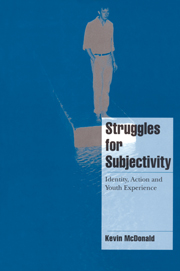Book contents
- Frontmatter
- Contents
- Acknowledgements
- Research participants
- 1 Introduction: subjectivity and social experience
- PART I The end of a working-class experience
- 2 You come from the bad side: exploring social experience
- 3 Something's gotta start: class consciousness
- 4 We're the scum: stigmatisation, racism and crisis
- 5 Morals is all you've got: in search of community
- 6 I want to get out of this: the struggle against social logics
- PART II Postmodern crisis: navigating the flow
- Bibliography
- Index
- Title in the series
5 - Morals is all you've got: in search of community
Published online by Cambridge University Press: 05 December 2011
- Frontmatter
- Contents
- Acknowledgements
- Research participants
- 1 Introduction: subjectivity and social experience
- PART I The end of a working-class experience
- 2 You come from the bad side: exploring social experience
- 3 Something's gotta start: class consciousness
- 4 We're the scum: stigmatisation, racism and crisis
- 5 Morals is all you've got: in search of community
- 6 I want to get out of this: the struggle against social logics
- PART II Postmodern crisis: navigating the flow
- Bibliography
- Index
- Title in the series
Summary
Racism: how can you talk sense after that?
A sociological intervention involves three stages. In the first stage research participants construct a picture of their social world, identifying issues and other social actors affecting them. The second stage explores relationships with these other actors, who also participate in the research sessions. Each encounter focuses the group on a different social relationship. Each highlights different issues: entry into and mobilisation within the world of work was underlined by the encounter with the employer; questions of order, disorder and community defence were posed through the encounter with the police; stigmatisation, frustration and the crisis of subjectivity were posed in the encounter with the youth campaigner; the encounter with the mayor crystallised issues of class consciousness and identity. Encounters with other social actors are critical, because each confronts the group with a different relationship, over which they have more or less control. In entering into dialogue with other actors, the research participants position themselves socially, construct an identity in the context of the relationship, address their interlocutor, listen to what they have to say, and respond. A relationship of communication is constructed, which serves as a lens through which to explore and map social relationships and the forms of power, creativity and identity at stake in these relationships. Each encounter is thus an opportunity to explore a social relationship.
The final stage of the intervention involves analysing what happened in the research process.
- Type
- Chapter
- Information
- Struggles for SubjectivityIdentity, Action and Youth Experience, pp. 89 - 103Publisher: Cambridge University PressPrint publication year: 1999

